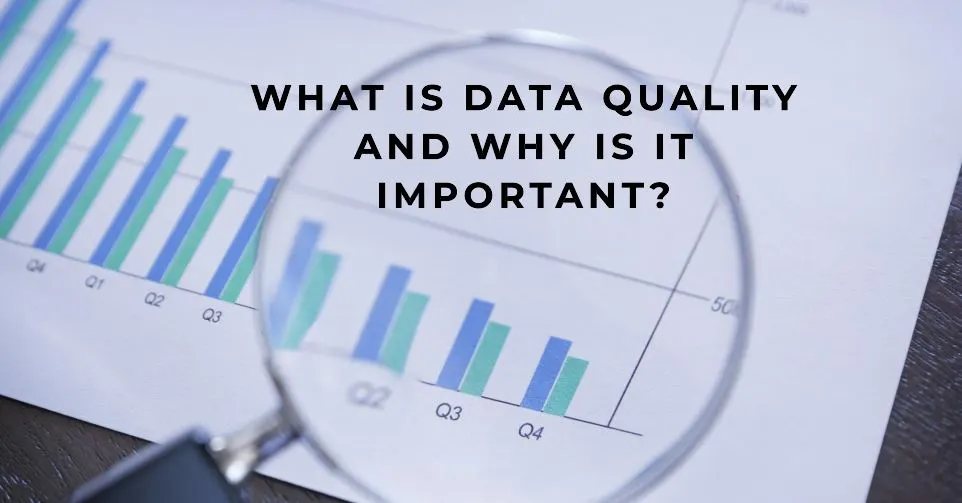Introduction: Understanding Data Quality
We live in a world where data is constantly being produced and consumed. Businesses, governments, and even individuals rely on data to make informed decisions. However, not all data is created equal. Poor data can lead to costly mistakes, misinterpretations, and missed opportunities. That’s where data quality becomes essential. Whether you’re managing a small business or considering a career in data analytics, understanding the importance of data quality is crucial.
What Is Data Quality?
Data quality refers to the condition of a dataset based on its ability to serve its intended purpose. Imagine you’re baking a cake, and the ingredients you use are either spoiled or not in the right measurements. No matter how good the recipe is, your cake will turn out poorly. The same applies to data. High-quality data means it is accurate, complete, timely, and reliable. If these factors aren’t met, the data becomes useless or even harmful.
Why Is Data Quality Important?
Have you ever made a decision based on incorrect or incomplete information? If so, you already understand why data quality is so important. High-quality data leads to better decision-making, increases trust, and enhances efficiency. For businesses, poor data quality can lead to financial losses, damaged reputations, and missed opportunities. Imagine running a marketing campaign based on outdated data—you’d likely reach the wrong audience, wasting both time and resources.
Key Characteristics of High-Quality Data
To determine whether the data you’re working with is of high quality, you need to consider several key characteristics:
- Accuracy: The data must reflect the real-world situation it describes. Incorrect data leads to wrong conclusions.
- Completeness: Incomplete data sets can cause significant gaps in analysis.
- Timeliness: Data should be up to date; outdated data can lead to flawed decisions.
- Consistency: Data must be consistent across different sources and systems.
- Reliability: The data should come from a trustworthy source.
How Poor Data Quality Affects Decision-Making
When it comes to decision-making, having poor-quality data is like trying to navigate a ship with a faulty compass. The direction you take will likely be wrong, leading to consequences such as:
- Wasted resources: Whether it’s time, money, or effort, bad data leads to misallocations.
- Loss of trust: If customers or stakeholders realize you’re using inaccurate data, it could damage your credibility.
- Missed opportunities: Inaccurate data might prevent you from identifying key market trends or emerging customer needs.
Common Causes of Poor Data Quality
Several factors can lead to poor data quality, including:
- Human error: Manual data entry is often a major source of mistakes.
- System errors: Sometimes software and hardware issues can corrupt or distort data.
- Inconsistent formats: Data collected from various sources may not be compatible, leading to inconsistencies.
- Outdated information: If data is not regularly updated, it loses its relevance and accuracy.
Data Quality Management
Data Quality Management (DQM) is the process of maintaining high standards for data collection, storage, and use. DQM is essential in ensuring that all data remains reliable and useful throughout its lifecycle. Companies typically use data governance frameworks and policies to manage data quality effectively. This involves defining roles, responsibilities, and processes that guide data-related decisions.
Data Quality Tools and Techniques
There are various tools and techniques designed to help businesses manage data quality. These include:
- Data profiling tools: These help to assess the quality of data by analyzing data attributes, such as format and consistency.
- Data cleansing tools: These are used to detect and correct inaccurate or corrupt data.
- Data monitoring systems: Continuous monitoring ensures that data remains high-quality throughout its lifecycle.
Improving Data Quality: Best Practices
Improving data quality requires ongoing effort. Here are some best practices:
- Regular Audits: Conducting regular audits of your data helps to identify and rectify inconsistencies.
- Standardization: Ensure that all data adheres to a standard format across all systems.
- Employee Training: Staff should be well-trained in data entry and management processes to minimize human error.
- Automation: Where possible, automate data collection and management to reduce the risk of manual errors.
The Role of Data Quality in Data Analytics
Data analytics is only as good as the data it is based on. Imagine building a house with weak, unstable materials. No matter how skilled the builder is, the house will eventually crumble. Similarly, poor data quality can ruin even the most advanced analytics project. Whether you’re analyzing customer behavior, forecasting sales, or optimizing processes, high-quality data will lead to better insights and more accurate predictions.
Why Data Quality Matters for Businesses
For businesses, data quality is not just a technical issue; it’s a strategic asset. With good-quality data, companies can:
- Improve customer satisfaction: Better data leads to better services and products.
- Increase operational efficiency: Accurate data allows for optimized workflows and processes.
- Enhance decision-making: Quality data helps businesses make better, more informed decisions.
Conclusion: The Future of Data Quality
As technology evolves, the importance of data quality will only increase. In a world where data drives decisions, ensuring the accuracy, completeness, and timeliness of data will become even more critical. Whether you’re a business owner, a student, or someone looking to enhance their career through a Data Analytics institute in Delhi, Noida, Lucknow, Indore, Chennai and more cities in India understanding and managing data quality will be key to your success.




